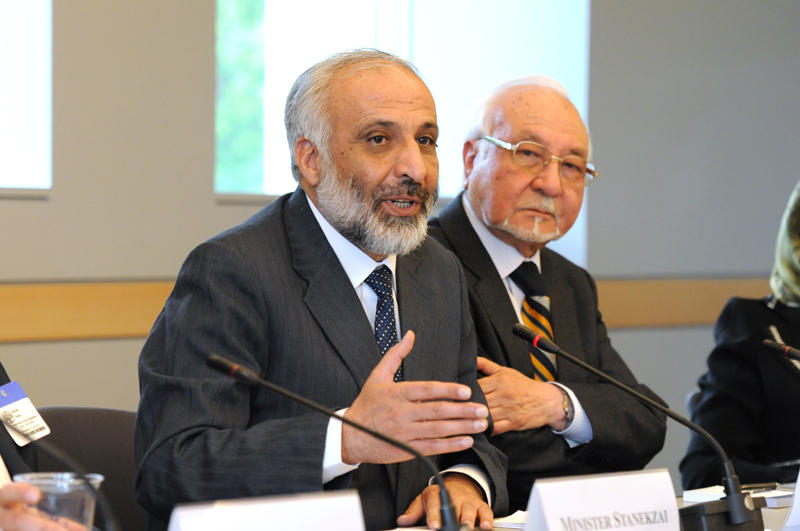Head of the Secretariat for Afghanistan's High Peace Council Visits USIP
Minister Masoom Stanekzai, the head of the Secretariat for Afghanistan’s High Peace Council, was joined by other members of the council as well as Afghanistan expert Dr. Barnett Rubin, serving as a senior adviser to the U.S. State Department’s Special Representative for Afghanistan and Pakistan. Stenekzai was a former fellow at USIP.

Peace in Afghanistan must not be seen as a one-time “deal,” but a longer-term process to be effective, says Minister Masoom Stanekzai, head of the Joint Secretariat of the High peace Council, after a visit to USIP.
The High Peace Council is the body that will play a central role in brokering peace in Afghanistan. Stanekzai visited USIP April 18 to discuss prospects for peace and the current status of talks as U.S. and international partners prepare for transition from Afghanistan in 2014 or even before. “Peace should not be seen as a deal,” he says. “It must be inclusive to include all Afghans, to create a space where Afghans can live together,” he said. Stanekzai was joined at USIP by other members of the council as well as Afghanistan expert Dr. Barnett Rubin, serving as a senior adviser to the U.S. State Department’s Special Representative for Afghanistan and Pakistan.
As the 2014 deadline for security transition approaches, and as Afghanistan confronts democratic elections that will result in a successor to President Hamid Karzai in 2014, there is new focus on the role the Peace Council and other actors can have on the peace and reconciliation process.
As events unfold over the next year or two, fears are mounting in Afghanistan that the country may return to the bitter factional fighting and civil war of the 1990s. In this context, the need for an inclusive and durable political settlement to help end the conflict in Afghanistan is increasingly imperative. However, defining and negotiating the details of such an agreement, especially with regards to negotiating with the Taliban, has proven to be exceedingly difficult and controversial. Afghanistan’s High Peace Council is mandated to initiate and pursue talks with the Taliban and other insurgent groups in order to identify and facilitate political solutions to end the conflict.
Stanekzai, in Washington for several days on a trip hosted by USIP, has floated the idea that the western-influenced Afghan Constitution may at some point may need to be reviewed and aspects of it amended to address concerns of different Afghan constituencies. But, he added, “any such changes must be reflective of the desires of an inclusive group,” he said.
“Change should come through a constitutional process, otherwise it will not be acceptable to the people,” he said. But there is much to do beforehand, to include “confidence-building measures” such as determining just who will participate in the peace process and then build consensus around those groups.
But it must be “Afghan-led,” as many Afghans and Westerners agree.
“The first thing is that this process has to be Afghan led and that all the international partners respect that notion and they should help.” Stanekzai was a former fellow at USIP.
“USIP was a very good platform” to discuss the issues confronting the peace process, he said. It is critical to engage people in dialogue and debate and find ways, in policies and strategies, to devise a peace on the basis of what’s going on on the ground. “USIP is doing a good job in terms of bringing policymakers and practitioners and academics to work in such a way that it will enrich the understanding people have of the issues,” he said.
USIP’s Andrew Wilder moderated the event. Other Peace Council members attended, including Ismail Qasemyar, Sediqa Balkhi, Hawa Alam Nuristani and Peace Council policy adviser Qaseem Ludin. The event April 18 helps to build on USIP’s recent events on the "Prospects for Peace in Afghanistan," another conversation held a week earlier that included Marc Grossman, State’s Special Representative for Afghanistan and Pakistan, Ahmed Rashid, Nilofer Sakhi, and USIP’s Senior Afghanistan Expert and former Afghanistan ambassador to France and Canada, Omar Samad.



